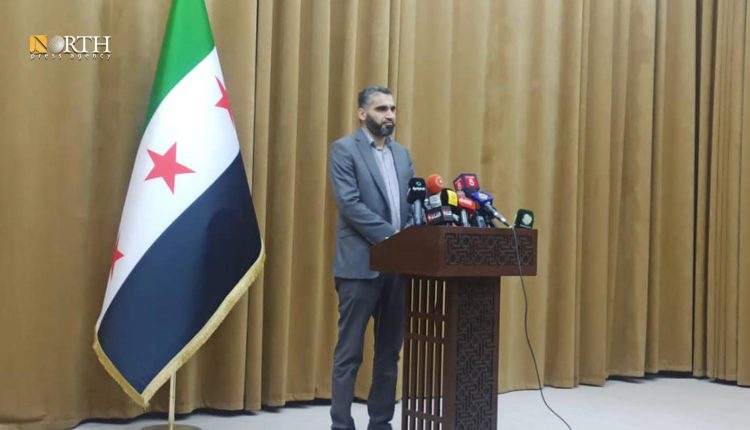Syria’s Electricity Ministry Plans to Increase Power Supply Amid Fuel Challenges
By Kardo Roj
DAMASCUS, Syria (North Press) – Syria’s Minister of Electricity, Omar Shaqrouq, announced on Wednesday that the government is working to increase household electricity supply to eight hours per day following the receipt of additional fuel shipments.
Speaking at a press conference in Damascus, Shaqrouq outlined a government strategy aimed at enhancing power availability, particularly for industrial zones, which he said would receive 24-hour electricity to support economic recovery. However, he acknowledged ongoing challenges in securing sufficient fuel to meet the country’s full energy demands.
Shaqrouq stated that the increase in electricity supply would apply to all Syrian provinces without exception. “We are committed to ensuring that both residential and industrial sectors receive the energy they need,” he said.
He revealed that the ministry is preparing to announce a new pricing structure for household electricity soon, a move intended to balance consumption and alleviate financial pressures on the energy sector.
Despite these efforts, he noted that achieving uninterrupted power nationwide remains a significant challenge. “To maintain 24-hour electricity supply, we require 23 million cubic meters of gas and 5,000 tons of fuel oil daily, which is currently beyond our capacity due to supply constraints,” he explained.
Shaqrouq highlighted ongoing efforts to secure additional energy resources, including potential gas imports from Qatar. Additionally, cooperation with the Ministry of Oil has facilitated the maintenance of fuel-powered power stations, leading to a slight improvement in electricity availability.
He pointed out that a recent gas shipment, which arrived last Thursday, has already helped improve power supply by two additional hours per day. Plans are in place to extend this to four additional hours in the near future, depending on fuel availability.
The electricity minister also addressed the financial challenges facing the sector, revealing that accumulated losses exceed $35 billion. The government’s priority, he said, is to support industrial development, ensuring that economic hubs receive stable electricity to encourage production and job creation.
Despite these ambitious plans, the success of Syria’s electricity expansion efforts will depend on continued fuel imports, infrastructure rehabilitation, and economic stability. While temporary improvements may ease some of the country’s energy shortages, long-term solutions remain uncertain amid broader financial and logistical difficulties.
By Kardo Roj
DAMASCUS, Syria (North Press) – Syria’s Minister of Electricity, Omar Shaqrouq, announced on Wednesday that the government is working to increase household electricity supply to eight hours per day following the receipt of additional fuel shipments.
Speaking at a press conference in Damascus, Shaqrouq outlined a government strategy aimed at enhancing power availability, particularly for industrial zones, which he said would receive 24-hour electricity to support economic recovery. However, he acknowledged ongoing challenges in securing sufficient fuel to meet the country’s full energy demands.
Shaqrouq stated that the increase in electricity supply would apply to all Syrian provinces without exception. “We are committed to ensuring that both residential and industrial sectors receive the energy they need,” he said.
He revealed that the ministry is preparing to announce a new pricing structure for household electricity soon, a move intended to balance consumption and alleviate financial pressures on the energy sector.
Despite these efforts, he noted that achieving uninterrupted power nationwide remains a significant challenge. “To maintain 24-hour electricity supply, we require 23 million cubic meters of gas and 5,000 tons of fuel oil daily, which is currently beyond our capacity due to supply constraints,” he explained.
Shaqrouq highlighted ongoing efforts to secure additional energy resources, including potential gas imports from Qatar. Additionally, cooperation with the Ministry of Oil has facilitated the maintenance of fuel-powered power stations, leading to a slight improvement in electricity availability.
He pointed out that a recent gas shipment, which arrived last Thursday, has already helped improve power supply by two additional hours per day. Plans are in place to extend this to four additional hours in the near future, depending on fuel availability.
The electricity minister also addressed the financial challenges facing the sector, revealing that accumulated losses exceed $35 billion. The government’s priority, he said, is to support industrial development, ensuring that economic hubs receive stable electricity to encourage production and job creation.
Despite these ambitious plans, the success of Syria’s electricity expansion efforts will depend on continued fuel imports, infrastructure rehabilitation, and economic stability. While temporary improvements may ease some of the country’s energy shortages, long-term solutions remain uncertain amid broader financial and logistical difficulties.

